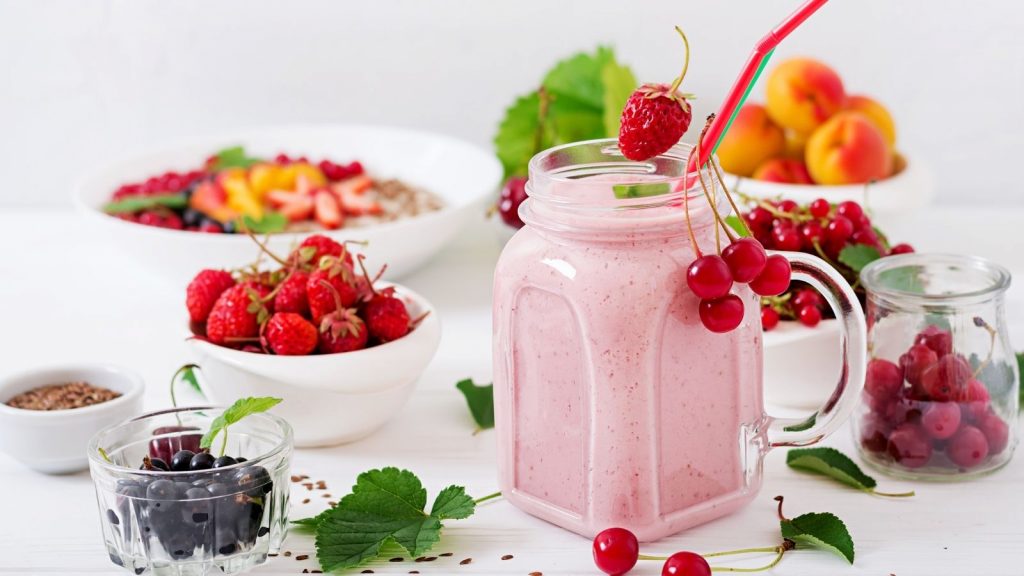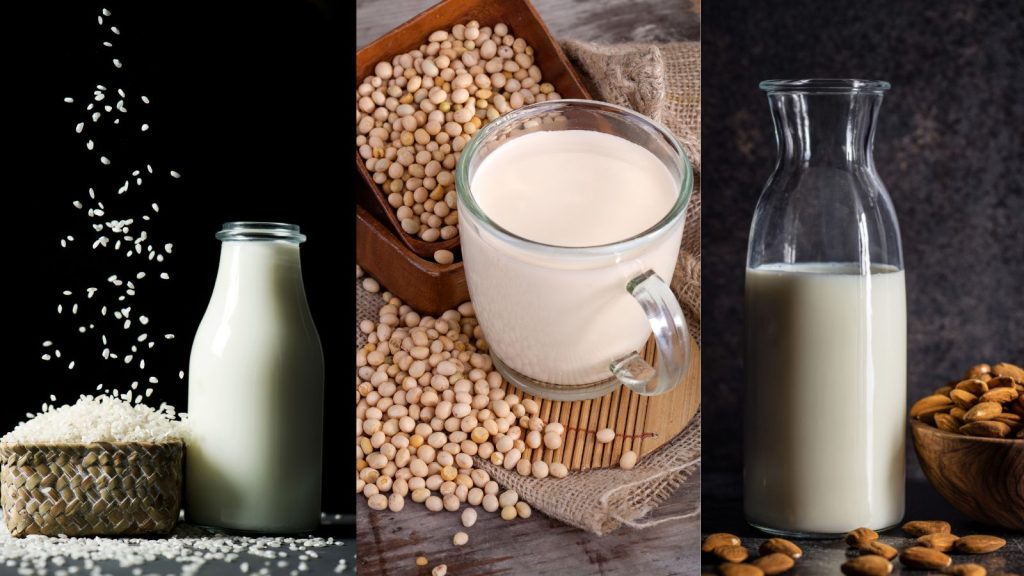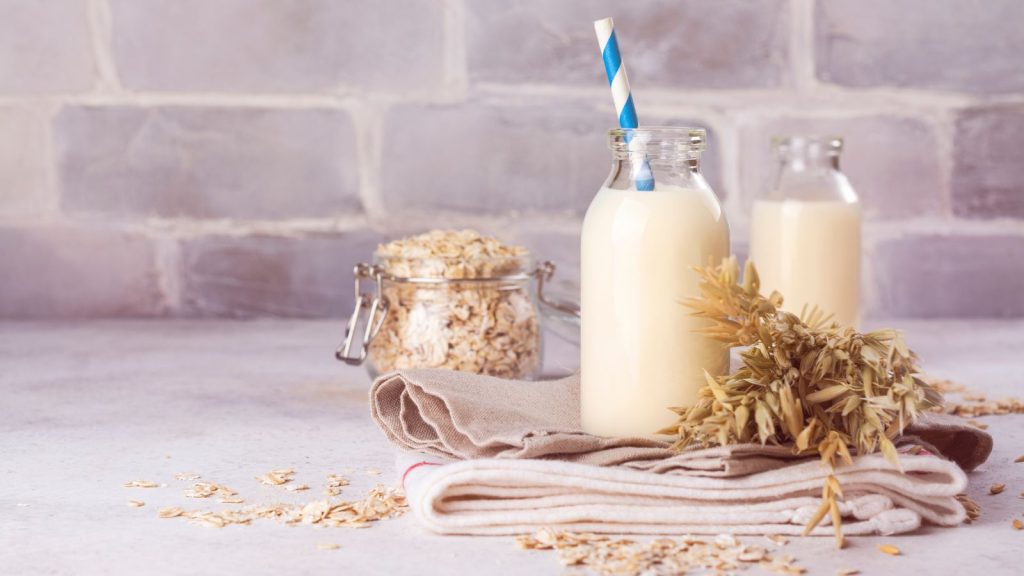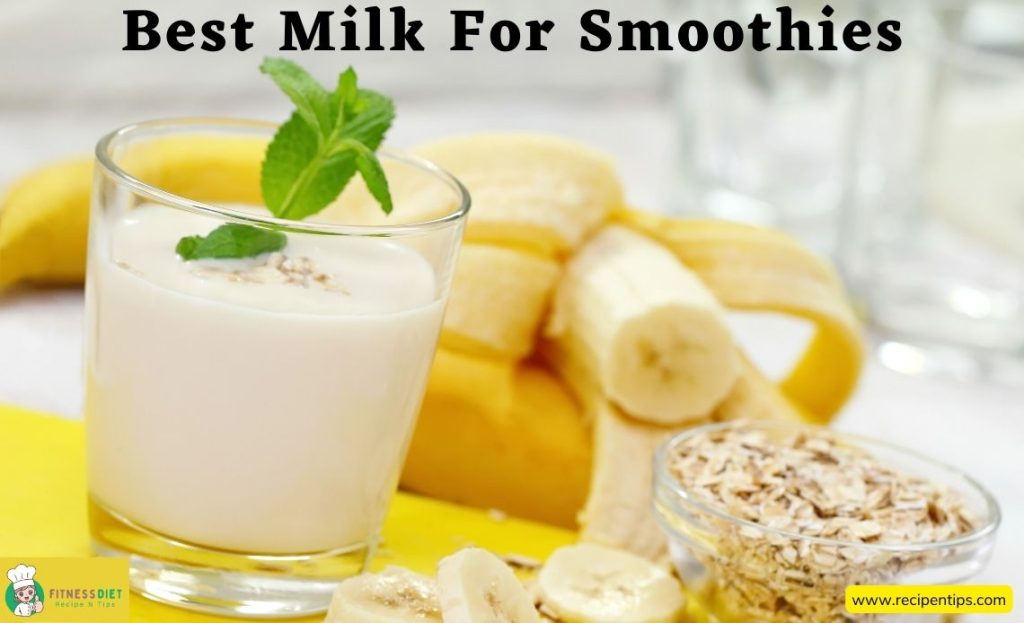It was a sunny afternoon, and the grocery store was crowded. I weaved in and out of the aisles, looking for the best milk for smoothies. I had to find something that would make my smoothies creamy and delicious.
I quickly ruled out soy milk—it just doesn’t taste as good as cow’s milk. I also didn’t want to buy almond milk because it could be expensive. That left me with only two options: regular cow’s milk or organic cow’s milk.
I was trying to decide which one to choose. Regular cow’s milk is cheaper, but some say organic milk is healthier. I weighd each option’s pros and cons and decided to buy organic cow’s milk.
I’m glad I made that decision because it makes a difference in my smoothies taste!
The different types of milk for smoothies and their benefits

Whole milk
Whole milk is the type of milk that most people are familiar with. It is milk that has not been processed or had any components removed. Whole milk is a good source of vitamins and minerals, including vitamin A, vitamin D, and calcium.
Low-fat milk
Low-fat milk is milk that has had some of its fat content removed. It is a good source of protein and calcium, and it contains fewer calories than whole milk.
Skim milk
Skim milk is milk that has had all of its fat content removed. It is a good source of protein and calcium, and it contains fewer calories than whole milk.
Buttermilk
Buttermilk is a type of fermented milk that has a slightly sour taste. It is a good source of protein and calcium and can be used in baking or as a marinade for meat.
Goat milk
Goat milk is a type of milk that goats produce. It is similar to cow’s milk in terms of nutrition, but some people find it easier to digest. Goat milk is a good source of calcium, phosphorus, and vitamin A.
Soy milk
Soy milk is a type of plant-based milk that is made from soybeans. It is a good source of protein and calcium and does not contain cholesterol or lactose. Soy milk can be used as a dairy-free alternative in baking or cooking.
Almond milk
Almond milk is a type of plant-based milk that is made from almonds. It is lower in calories than other types of milk and contains no cholesterol or lactose. Almond milk can be used as a dairy-free alternative in baking or cooking.
What to look for when buying milk for smoothies
- Look for milk that is high in protein.
- Choose milk that is low in fat.
- Select milk that is free of antibiotics and growth hormones.
- Choose milk that is organic and from grass-fed cows.
- Ensure the milk is refrigerated and has a clean, fresh taste.
How to make the perfect smoothie every time

Choose your base
The first step to making a perfect smoothie is to choose your base. You can use milk, yogurt, almond milk, or even water. If you want your smoothie to be extra creamy, you can use full-fat milk or yogurt. If you’re looking for a healthier option, you can use almond milk or water.
Add your fruits and vegetables
The next step is to add your fruits and vegetables. You can use fresh or frozen fruits and vegetables. You may need to add ice to your smoothie if you’re using fresh fruits and vegetables. You won’t need to add ice if you’re using frozen fruits and vegetables.
Choose your sweetener
The third step is to choose your sweetener. You can use honey, agave nectar (but try to avoid it or use it the least), or even sugar. If you want to make a healthy smoothie, you should also try to avoid using sugar.
Add your extras
The fourth step is to add your extras. It is where you can get creative with your smoothie. You can add protein powder, flaxseed oil, chia seeds, or anything else you think would be good in a smoothie.
Blend and enjoy!
The final step is to blend everything and enjoy!
What is the best milk for smoothies for weight loss?

Skim milk
Skim milk is the best type of smoothie for weight loss because it has the lowest fat and calories. A cup of skim milk contains about 90 calories and 0 grams of fat, making it an excellent option for losing weight.
Additionally, skim milk is a good source of protein and calcium, essential for maintaining a healthy weight.
Non-fat yogurt
Non-fat yogurt is also a good choice for smoothies for weight loss as it is low in fat and calories. A cup of non-fat yogurt contains about 100 calories and 0 grams fat. Yogurt is also a good source of protein and calcium.
Soy milk
Soy milk is a good choice for smoothies for weight loss as it is low in calories and fat but high in protein. A cup of soy milk contains about 120 calories and 4 grams of fat, making it a lower-calorie option than skim milk or non-fat yogurt. Soy milk is also a good source of calcium.
Almond milk
Almond milk is another good choice for smoothies for weight loss as it is low in calories but high in protein. A cup of almond milk contains about 60 calories and 2.5 grams of fat, making it a lower-calorie option than soy milk or skim milk. Almond milk is also a good source of calcium.
Rice milk
Rice milk is the least recommended milk for smoothies for weight loss as it is higher in calories than other types of milk. A cup of rice milk contains:
- About 130 calories and 2 grams of fat.
- Making it a higher-calorie option than skim milk.
- Non-fat yogurt.
- Soy milk.
- Almond milk.
What is the best nondairy milk for smoothies?
Many non-dairy kinds of milk can have a distinct taste which could detract from some smoothie recipes, but oat milk is a great option that is becoming increasingly popular.
With its subtly sweet flavor and creaminess, oat milk blends perfectly into smoothie mixtures while also providing vitamins such as Vitamin A and B6.
Oat milk also contains nearly the same amount of protein found in cow’s milk, making it an excellent alternative for those with dietary restrictions who still want to get the most out of their smoothie experience.
Is almond milk good for smoothies?
Almond milk can be a great addition to smoothies! When used in place of regular cow’s milk, almond milk lends a creamy texture and extra nutritional value that can help power up your smoothie.
Unlike dairy milk, it’s naturally lower in calories and saturated fat yet still offers ample protein, vitamin D, and calcium for lasting energy throughout the day.
Almond milk doesn’t separate or curdle when added to the blender as traditional dairy products do. So if you’re looking to lighten up your smoothie without compromising on taste and nutrition, give almond milk a try!
Is oat milk good for smoothies?

Oat milk is increasingly becoming a popular choice when making smoothies. Not only is it appealing for its health benefits, but it also adds an extra creamy texture to one’s smoothie.
Studies have shown that oat milk is high in essential nutrients such as calcium, vitamins D and B-12, and contains several antioxidants, making it an excellent healthy alternative to cow’s milk.
Furthermore, due to its composition of complex carbohydrates, it naturally has fewer calories than other dairy substitutions like almond or coconut milk.
And since slow-release carbs help maintain energy throughout the day with no sugar spikes, oat milk is the perfect base for a filling and nutritious smoothie that won’t leave you craving more than an hour later.
Is coconut milk good for smoothies?
Coconut milk, not to be confused with other types of milk, such as almond or oat, is an excellent liquid for making smoothies. It provides a creamy texture and an incredible flavor boost to a smoothie, adding even more complexity and depth.
Not only that, but coconut milk is also packed with nutrition — it’s low in fat, high in antioxidants, and loaded with vitamins, minerals, and electrolytes.
Plus, it’s vegan and lactose-free for those who have allergies or dietary restrictions. This makes it an excellent choice for anyone looking for a delicious and nutritious way to enjoy their daily smoothie!



